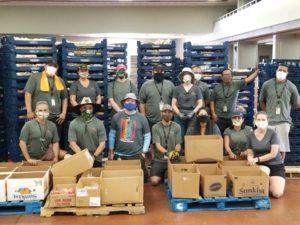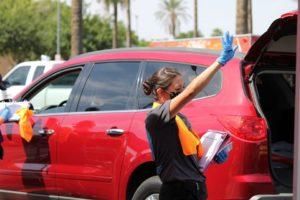By Recker McDowell —
Natalie Lewis has seen immediate and great community needs rise out of the COVID-19 pandemic.
Lewis, who is assistant city manager for the city of Mesa, said her East Valley city had to move fast to address needs of residents in need of food, small businesses needing help with rent and vulnerable residents including seniors and the homeless.
The needs arising from COVID-19 also show the importance of frontline workers and the essential roles played by nonprofits, faith-based and community groups
“We had days and weeks to roll-out these very comprehensive programs. These are unprecedented times and city staff had never administered many of the Mesa Cares programs rolled out, but with the drive of many city staff and the help of community partners, the city of Mesa pivoted staff quickly to focus on Mesa’s highest needs,” Lewis said.
Mesa’s response the COVID-19 includes helping 530 small businesses with rent and other bills, helping pay for and delivering 2,100 meals per week to health care workers on the frontlines of the pandemic and helping 1,000 city residents with utility and other payments as job losses due to the pandemic mounted.
Those on the frontlines of COVID-19 quickly found food insecurity and hunger were some of the most immediate needs from the pandemic.
Mesa has worked with nonprofit and community groups to address community food needs during COVID-19.
Those partnerships show how important nonprofits and community agencies are to addressing the immediate needs that arose from COVID-19. And, many of those nonprofits are dealing with their own challenges with the pandemic canceling fundraisers and biting into donations.
Nonprofits have proved their mettle teaming with Mesa to help those most in need right now.
The United Food Bank and Mesa have distributed more than 1,700 emergency food boxes to households in need. The Midwest Food Bank, House of Refuge and city of Mesa provided another 1,000 food boxes to residents. Mesa’s Adopt-Grandparent-Program has worked with food banks, churches, and volunteers to help 200 seniors with groceries, prescriptions, and mental health check-ins.
Meals on Wheels programs have delivered 11,800 seniors and home-bound adults during the pandemic. Demand for those meals are up almost 100 percent from a year ago.
“Our programs are feeding hungry people, allowing businesses to stay open, helping residents keep their water and electric services stay on, helping homeless people find food and shelter and get them back on their feet, and assist Mesa students with their learning needs,” said Mesa Assistant City Manager Kari Kent.
 The city has also helped local nonprofits. Mesa has collected more than 15,200 pounds of food for food banks through weekly drives. The city government also reassigned 100 employees from to other departments to Mesa Cares programs to help serve residents and partner with nonprofits.
The city has also helped local nonprofits. Mesa has collected more than 15,200 pounds of food for food banks through weekly drives. The city government also reassigned 100 employees from to other departments to Mesa Cares programs to help serve residents and partner with nonprofits.
We all should remember the nonprofits, their volunteers and workers who have stepped forward during COVID-19. We should remember them and their needs now and hopefully after the Coronavirus and the current turmoil becomes a memory. They are the backbone of our communities, along with small businesses and those on the frontlines whether they be health care workers or with city agencies helping the most vulnerable and the most impacted.
Lewis said Mesa also had to make sure it was spending its allotment of federal money from the CARES Act properly.
“The other great challenge was knowing that there will be an audit on the use of these federal dollars. Thus, having clear guidance on the eligibility for use of these dollars was critical and rolled out over time,” Lewis said.
There will be some needed scrutiny of responses to COVID-19. But we have seen in Mesa and other communities how important frontline workers and frontline agencies are to helping those in need now and in the future.

